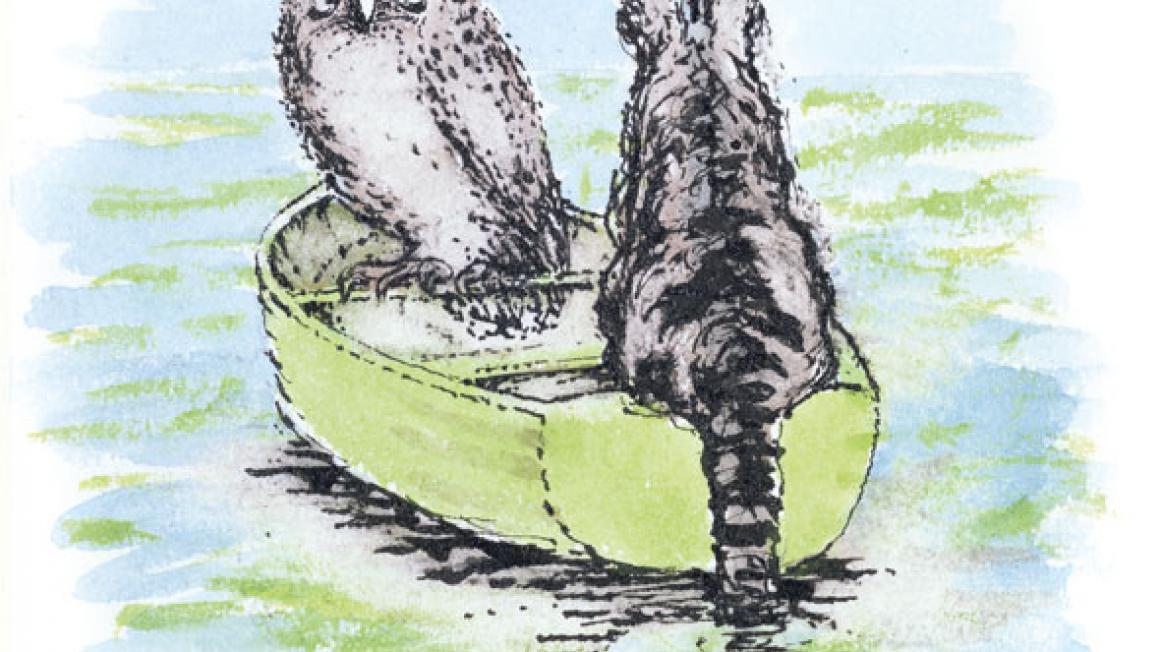Poems to learn by heart
CHOOSE A POEM THAT YOU LOVE
If you are new to learning poems by heart, I would recommend starting with shorter verses. Look for poems with a strong rhyme scheme and a steady rhythm. Most importantly, choose a poem that you love. Write it out to get a feel for the lines. Read it aloud several times, and you may find it helpful to walk in time with the poem’s rhythm and recite the words in time with your footsteps. Take it line by line: recite the first line until it is perfect, then add the second, and so on. Do not learn a new line until you can recite the previous lines perfectly. Before long, the poem is yours: caught fast in memory and ready to be recalled when wanted and needed.I hope that this small selection inspires you to seek out other verses with which to fill the shelves in your inner library.
Poems To Learn By Heart, by Ana Sampson (Michael O’Mara Books, £12.99).
Alexander Pope (1688–1744) Ode On Solitude
Happy the man, whose wishand care
A few paternal acres bound,
Content to breathe his
native air, In his own ground.
Whose herds with milk,
whose fields with bread,
Whose flocks supply him
with attire,
Whose trees in summer yield
him shade,
In winter fire.
Blest! who can
unconcern’dly find
Hours, days, and years slide
soft away,
In health of body, peace of
mind,
Quiet by day,
Sound sleep by night; study
and ease
Together mix’d; sweet
recreation, And innocence, which most
does please,
With meditation.
Thus let me live, unseen,
unknown;
Thus unlamented let
me die;
Steal from the world, and
not a stone
Tell where I lie.
Rupert Brooke (1887–1915) The Soldier
If I should die, think onlythis of me:
That there’s some corner of
a foreign field
That is forever England.
There shall be
In that rich earth a richer
dust concealed;
A dust whom England bore,
shaped, made aware,
Gave, once, her flowers to
love, her ways to roam,
A body of England’s,
breathing English air,
Washed by the rivers,
blest by suns of home.
And think, this heart, all
evil shed away,
A pulse in the eternal mind,
no less
Gives somewhere back the
thoughts by England given,
Her sights and sounds;
dreams happy as her day;
And laughter, learnt of
friends; and gentleness,
In hearts at peace, under
an English heaven.
Edward Lear (1812–1888) The Owl And The Pussy-Cat
The sing-song rhythm of Lear’s most famous poem gives it the pleasing quality of a lullaby, so it isn’t surprising that many of us learnt it as children.The Owl and the Pussy-cat
went to sea
In a beautiful pea-green
boat,
They took some honey, and
plenty of money,
Wrapped up in a five-pound note.
The Owl looked up to the
stars above,
And sang to a small guitar,
‘O lovely Pussy! O Pussy, my
love,
What a beautiful Pussy you
are,
You are,
You are!
What a beautiful Pussy you are.’
Pussy said to the Owl, ‘You
elegant fowl!
How charmingly sweet
you sing!
O let us be married! too long
we have tarried:
But what shall we do for a ring?’
They sailed away, for a year
and a day,
To the land where the
Bong-tree grows,
And there in a wood a
Piggy-wig stood,
With aring at the end of his
nose,
His nose,
His nose,
With a ring at the end of his nose.
‘Dear Pig, are you willing to
sell for one shilling
Your ring?’ Said the Piggy,
‘I will.’
So they took it away, and
were married next day
By the Turkey who lives on
the hill.
They dinèd on mince, and
slices of quince,
Which they ate with a
runcible spoon;
And hand in hand, on the
edge of the sand,
They danced by the light of
the moon,
The moon,
The moon,
They danced by the light of
the moon.
WH Auden (1907–1973) Funeral Blues
This bleakly beautiful poem is simple to learn, but deeply affecting.Stop all the clocks, cut off the
telephone,
Prevent the dog from
barking with a juicy bone,
Silence the pianos and with
muffled drum
Bring out the coffin, let the
mourners come.
Let aeroplanes circle
moaning overhead
Scribbling on the sky the
message He is Dead,
Put crêpe bows round the
white necks of the public
doves,
Let the traffic policemen
wear black cotton gloves.
He was my North, my South,
my East and West,
My working week and my
Sunday rest,
My noon, my midnight, my
talk, my song,
I thought that love would
last for ever: I was wrong.
The stars are not wanted
now: put out every one;
Pack up the moon and
dismantle the sun;
Pour away the ocean and
sweep up the wood;
For nothing now can ever
come to any good.

William Wordsworth (1770-1850) I Wandered Lonely As A Cloud
This is probably one of the most memorised poems in the English language, but you will be in the minority if you can recall all the verses.I wandered lonely as
a cloud
That floats on high o’er
vales and hills,
When all at once I saw
a crowd,
A host, of golden daffodils;
Beside the lake, beneath
the trees,
Fluttering and dancing
in the breeze.
Continuous as the stars
that shine
And twinkle on the milky
way,
They stretched in never-
ending line
Along the margin of a bay:
Ten thousand saw I at
a glance,
Tossing their heads in
sprightly dance.
The waves beside them
danced; but they
Out-did the sparkling
waves in glee:
A poet could not but be gay,
In such a jocund company:
I gazed – and gazed – but
little thought
What wealth the show to
me had brought:
For oft, when on my couch
I lie
In vacant or in pensive
mood,
They flash upon that
inward eye
Which is the bliss of
solitude;
And then my heart with
pleasure fills,
And dances with the
daffodils.


